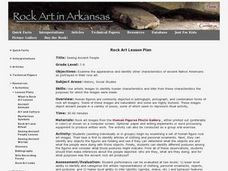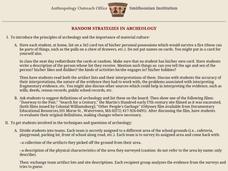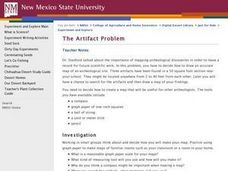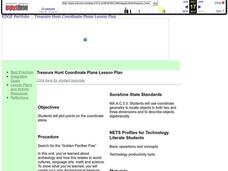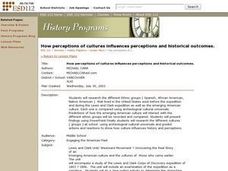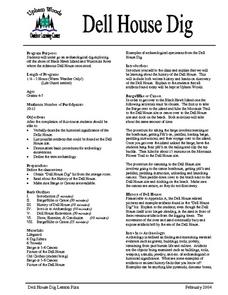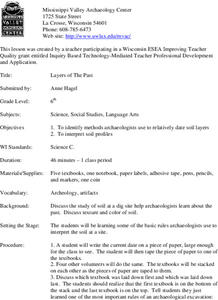Curated OER
Social Studies: People in the Rocks
Students discover characteristics of Native Americans as depicted in their rock art. By examining the rocks from the Human Figures Photo Gallery, they make inferences about the activities and purposes of the people drawn on them.
Curated OER
Archaeology
Students explore purpose and process of archaeology, as well as demonstrate how it applies to their own lives, through a simulated archaeological dig.
Curated OER
Random Strategies in Archaeology
Students critically evaluate cultures according to their artifacts. In this Random Strategies in Archaeology lesson, Students interpret evidence in order to better understand ancient societies. Students watch films that affect their...
Curated OER
The Artifact Problem
Students work in small groups and make a map of a familiar room. In this artifact lesson plan, students decide on a suitable scale for their maps, the tools they will use and how they will make it and decide on strategies they would use...
Curated OER
The Ancient Cliff Dwellers of Mesa Verde
Students research evidence discovered during Mesa Verde archaeological dig, view images of ancient artifacts, simultate real dig and reconstruct items buried on school grounds, and create newsletter or video tape skit.
Curated OER
Jamestown Fort: Finding History
Students identify artifacts discovered from the exploration of the Jamestown fort in order to help them create a short fictional account about the lives of Jamestown's first inhabitants. In this history lesson, students research the...
Curated OER
Mexican-American Life in Texas
Sixth graders examine the development of cotton farms in Texas and the use of Mexican-Americans as a labor force. They examine pictures of life on cotton farms and draw pictures of themselves performing one of their own daily chores. ...
Curated OER
How Do They Know That
Students explore methods for reconstructing the past. In this forest succession lesson, students examine forest succession and how to read the land in order to predict patterns of change. Students will visit a historical site, act as an...
Curated OER
Mapping with a Compass: A Simulated Survey
Students use compasses and grids to map the locations of artifacts found in a simulated dig site. In groups, they role-play as future archeologists excavating a school site. Groups begin at their assigned datum and site the artifacts...
Curated OER
Coordinate Plane Treasure Hunt
Students create a treasure map by plotting points on a coordinate plane using a computer drawing program. Students name and identify different landmasses and structures on their map. They create instructions to find the treasure that...
Curated OER
How Perceptions of Cultures Influences Perceptions and Historical Outcomes
Students research different ethnic groups that lived in the United States. They compare and contrast Spanish, African American and Native American cultures and how American culture interacted with them. They present their findings...
Curated OER
Investigating History with Kidd Gloves
Students act as historical archeologists and use their analytical skills to deduce, from lists of items related to historic figures, accurate details about the lives of those people.
Curated OER
Scientific Thinking
Middle schoolers participate in four different activities which reinforce an understanding of they way scientists think about the world. They make careful observations of two different pennies, write the procedure for making a peanut...
Curated OER
Dell House Dig
Pupils experience an archaeological dig exploring off the shore of Black Hawk Island and Wisconsin River. They study in the same place where the infamous Dell House once stood. Dell House and its historical significance is reviewed...
Curated OER
Cathlapolte.... Catching Time's Secrets
Third graders investigate nature by studying a Chinook village from the past. In this sustainable living instructional activity, 3rd graders examine the architecture, environment and activities of the Chinook people. Students...
Curated OER
Coordinate Grid: Mapping an Archaeological Site
Young scholars examine how archaeologists preserve context of sites through use of rectangular grid or Cartesian coordinate system, and develop sense of distance by pacing off and estimating distances.
Curated OER
Location, Location, Location: Using a Grid to Determine Context
Seventh graders are introduced to making inferences about artifacts. Using a grid system, they locate the artifacts and determine where they originated from. They use this information to make conclusions about the way people lived...
Curated OER
The Battle of Stones River: The Soldiers' Story
Learners organize items in a "doohickey kit" distributed by the teachers, creating categories using classification schemes. In this classification instructional activity, students compare systems within groups and write questions that...
Curated OER
A Monument for Marine Conservation
Pupils explore the Northwestern Hawaiian Islands to discover what's there and pick up clues as to how people have both harmed and helped the native habitats. They study another protected area and see how to balance conservation efforts...
Curated OER
Social Studies: Cooking Methods - Past and Present
Fourth graders identify geographic regions (Texas' Edwards Plateau) and sequence steps in the hot rock cooking process. They compare and contrast prehistoric and contemporary cooking methods. Students conduct online research and record...
Curated OER
The Art of the Quilt
Students examine why fabric was first sewn in layers and how it was used. They identify, compare and make 3 different fabric design types which will become a basis for looking at the quilts created by African Americans. They begin the...
Curated OER
Layers of The Past
Sixth graders identify methods archaeologists use to date soil layers. They interpret soil profiles and discuss the examination of soil at a dig site. They discuss texture and color of soil.
Curated OER
The Mound Builders
Fifth graders examine mound building Indian tribes. They identify the two groups of Mound-Building Indians and explore the reasons for building mounds. Students identify places where the mounds exist. They create a model of an Indian mound.
Curated OER
The Anasazi
Sixth graders investigate and determine the origins of the ancient Anasazi who inhabited present-day Utah and the Four-Corners-Region, after receiving direct instruction and carrying out activities in cooperative group settings. They...
Other popular searches
- Archeology Dig
- Archeology Artifacts
- Artifacts and Archeology
- Science Archeology
- Archeology of the Future
- Archeology Internet
- Material Culture Archeology
- Archeology Animal
- Music and Archeology
- Florida History Archeology
- Archeology Math
- Pottery, Archeology
